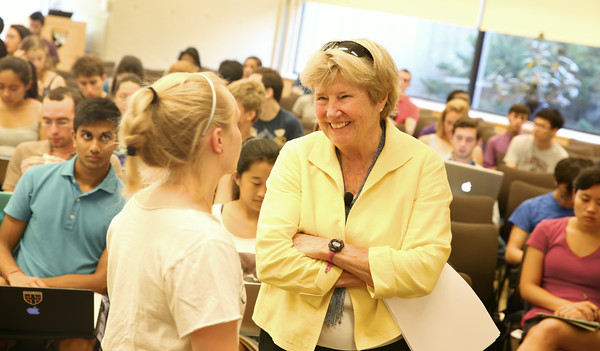
News
When Professors Speak Out, Some Students Stay Quiet. Can Harvard Keep Everyone Talking?

News
Allston Residents, Elected Officials Ask for More Benefits from Harvard’s 10-Year Plan

News
Nobel Laureate Claudia Goldin Warns of Federal Data Misuse at IOP Forum

News
Woman Rescued from Freezing Charles River, Transported to Hospital with Serious Injuries

News
Harvard Researchers Develop New Technology to Map Neural Connections
Are You Arriving or Departing?

When I recently visited an airport, I experienced a moment of panic and confusion as I reached a fork in the road and had to decide whether to take the ramp that said “arriving” or the ramp that said “departing.”
As graduates of Harvard College, let me ask you: Are you arriving or are you departing? Are you arriving at a new station in life, holding your arms out to welcome your newly conferred status as alumni or are your arms grasping at the past—the memories of your undergraduate years from which you now depart? While airport ramps and forks in the road don’t let us simultaneously arrive and depart, at this special moment in your lives, you do have the rare opportunity to simultaneously experience both.
Speaking of arrivals, have you ever stopped to think about how you got here? What were the factors that enabled you to become members of the Harvard College class of 2016? Was it a teacher or a coach who encouraged you to apply, even though you thought Harvard was well beyond your reach? Maybe it was due to your brilliant application essay or the many hours you spent with practice SAT tests or mastering a language. Perhaps there were factors totally out of your control, like your zip code or your parents’ dreams since the day you were born that Harvard was in your future. Maybe, your parents made extraordinary sacrifices, moving from home to home or from one country to another, to put you on the best possible path to Harvard.
Whatever the factors were, whether personal or societal, it is likely that you received a high quality, outstanding education long before you ever arrived in Cambridge. And even if you didn’t attend the best of schools, it is likely that someone in your life helped open doors of opportunity for you that remain closed to many of your childhood peers.
As you think about your long ago arrival and imminent departure, I want you to remember that a high quality education and the opportunity to attend Harvard is not within the reach of most children in the United States. A very inconvenient truth is that whether due to poverty, poor schools, inadequate health, or dysfunctional families, many highly capable and talented youth will not have the same opportunities that you have had. And without dramatic changes in our K-12 education system, many youth are destined to be a drain on our society. That’s both your society and mine.
Consider these statistics: Here, in arguably the richest country in the world, 25 percent of children live in poverty! And for students of color, that number is closer to one out of two. And even if the pernicious effects of poverty were not alarming enough, there is a strikingly high correlation between income and test scores. Even though the U.S. ranks third internationally in per pupil spending, more than one-quarter (26 percent) of 15-year-olds in the United States are not considered proficient by international standards—the level at which individuals will be able to participate effectively and productively in life. Essentially, the poorer you are, the worse you will do academically.
If you think that these data are of little concern to you, esteemed members of the Harvard College class of 2016, please think again! As I have often said in United States in the World 35, “If you are not outraged by these data, then you simply aren’t paying attention!”
Now, as you arrive at a new place in your life, I want you to appreciate the role that education can have in shaping the future of society. Children represent nearly 25 percent of our total population and yet they are 100 percent of our future. And the future depends on the quality of education that children will receive.
The future of our society lies in your hands. Whether you become a lawyer, doctor, writer, software engineer, entrepreneur or Nobel Prize winner, there are many ways to connect the world in which you will live to the education and well-being of children. Of course, I would love for every Harvard student to become a teacher, but realistically you have many different callings. Still, there are limitless ways that each of you can contribute to the education of children.
As you reflect back on your time here, know that the duty to give back to children who may not have had the same opportunities as you is the only way we will achieve a just and worthy society. If you accept the logic of my argument here, your involvement will possibly help one or many future students both arrive and depart from Harvard College.
I leave you with the wise words of John F. Kennedy ’40, who, just like all of you today, once arrived and departed from Harvard. “For of those to whom much is given, much is required.”
Katherine K. Merseth is a Senior Lecturer at the Harvard Graduate School of Education and Director of the Harvard Teacher Education Program. She teaches the undergraduate course, “United States in the World 35: Dilemmas of Equity and Excellence in American K-12 Education.”
Want to keep up with breaking news? Subscribe to our email newsletter.
